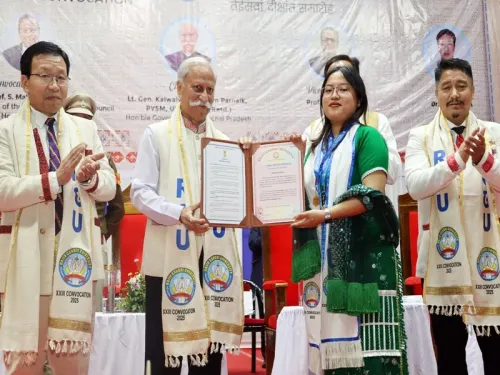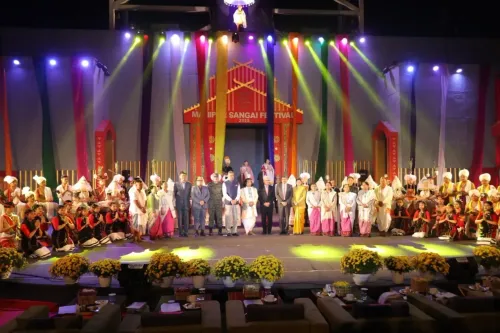Rajasthan Unveils New Bill to Prevent Illegal Religious Conversions

Synopsis
Key Takeaways
- Introduced by Bhajan Lal Sharma's government.
- Requires applications 60 days prior to conversions.
- Imposes penalties up to 10 years imprisonment.
- Defines unlawful conversions and related terms.
- Establishes compensation for victims.
Jaipur, Feb 3 (NationPress) The Bharatiya Janata Party government, headed by Bhajan Lal Sharma, introduced the Rajasthan Prohibition of Unlawful Conversion of Religion Bill, 2025 during the current Budget Session of the Assembly on Monday.
The State Health Minister, Gajendra Singh Khinvsar, presented the Bill, which is designed to combat illegal religious conversions throughout the state.
The legislation requires individuals wishing to convert to a different religion to file an application with the District Magistrate at least 60 days prior to the conversion.
It also includes penalties for cases of coercive conversions.
The Bill aims to halt unlawful religious conversions, prescribing a maximum imprisonment of 10 years and fines up to Rs 50,000.
Conversions achieved through deception, coercion, undue influence, or fraudulent means, including marriage, are categorized as offences.
In instances of mass conversions, the Bill mandates a minimum prison sentence of three years, which can extend to 10 years, alongside a fine of Rs 50,000.
Moreover, those who intend to convert voluntarily must present a declaration in a specified format to the District Magistrate at least 60 days in advance.
The Bill underscores that India's Constitution upholds religious freedom, reflecting the commitment to secularism and social unity.
However, it emphasizes that religious freedom does not permit forced or deceptive conversions.
This legislation is established to prevent unlawful religious conversions and associated activities.
It defines essential terms necessary for its implementation.
The Bill also states that any marriage conducted solely for the purpose of unlawful conversion, or vice-versa, will be deemed void by the Family Court or the appropriate jurisdictional court.
The term "conversion" is identified in the Bill as abandoning one's own faith to embrace another; "force" includes threats or coercion against the individual being converted or any other person; "fraudulent means" refer to impersonation or false pretenses; "mass conversion" indicates the conversion of two or more individuals; "minor" denotes anyone under 18 years of age; and "religion" encompasses any organized system of belief and worship in India.
The "religion convertor" refers to individuals who facilitate conversion from one religion to another; "undue influence" implies the unethical use of power by one individual over another to persuade them; and "unlawful conversion" signifies any conversion not adhering to existing laws.
Recently, numerous cases have emerged where individuals have fallen prey to conversion practices involving misrepresentation and coercion.
The Bill notes, "While laws regarding the right to religious freedom exist in numerous states, Rajasthan lacked a formal statute on this matter, prompting the need to enact a law against unlawful conversion."
According to the Bill, the court will also ensure appropriate compensation up to Rs 5 lakh payable to the victim of conversion by the accused.
Additionally, the Bill proposes enhanced penalties for repeat offenders.










